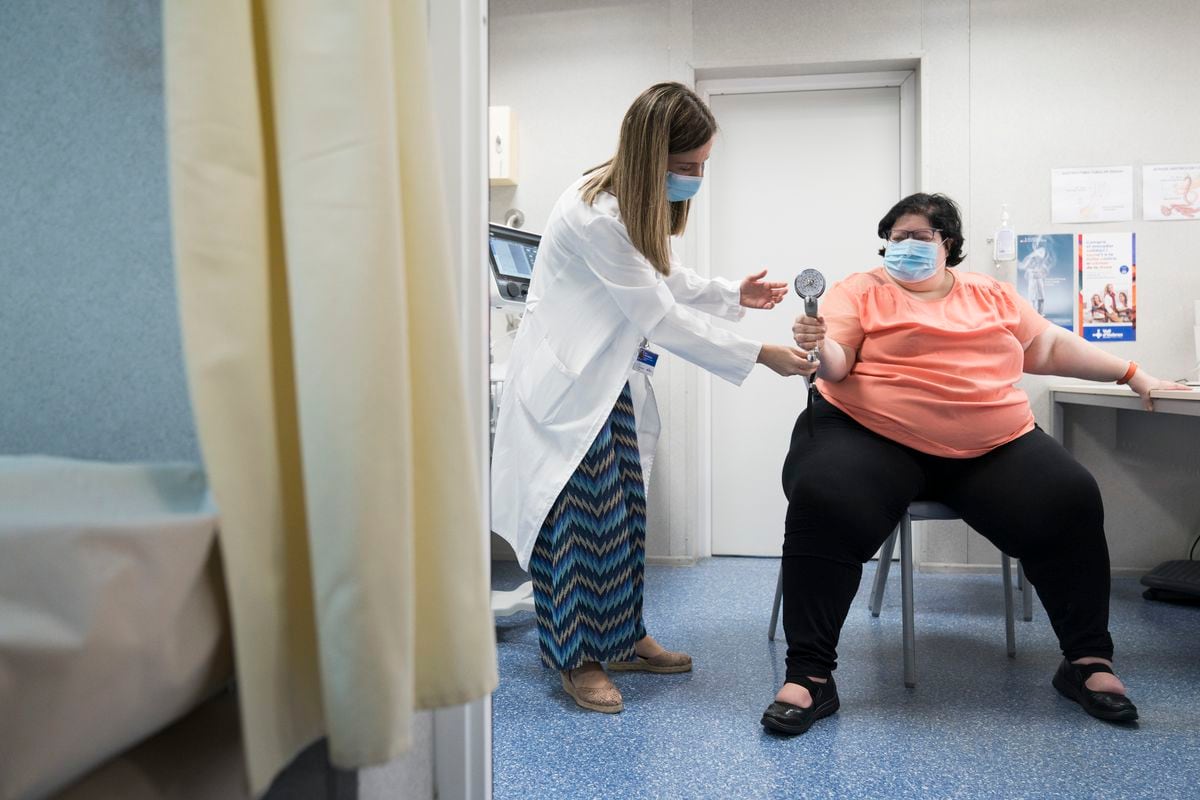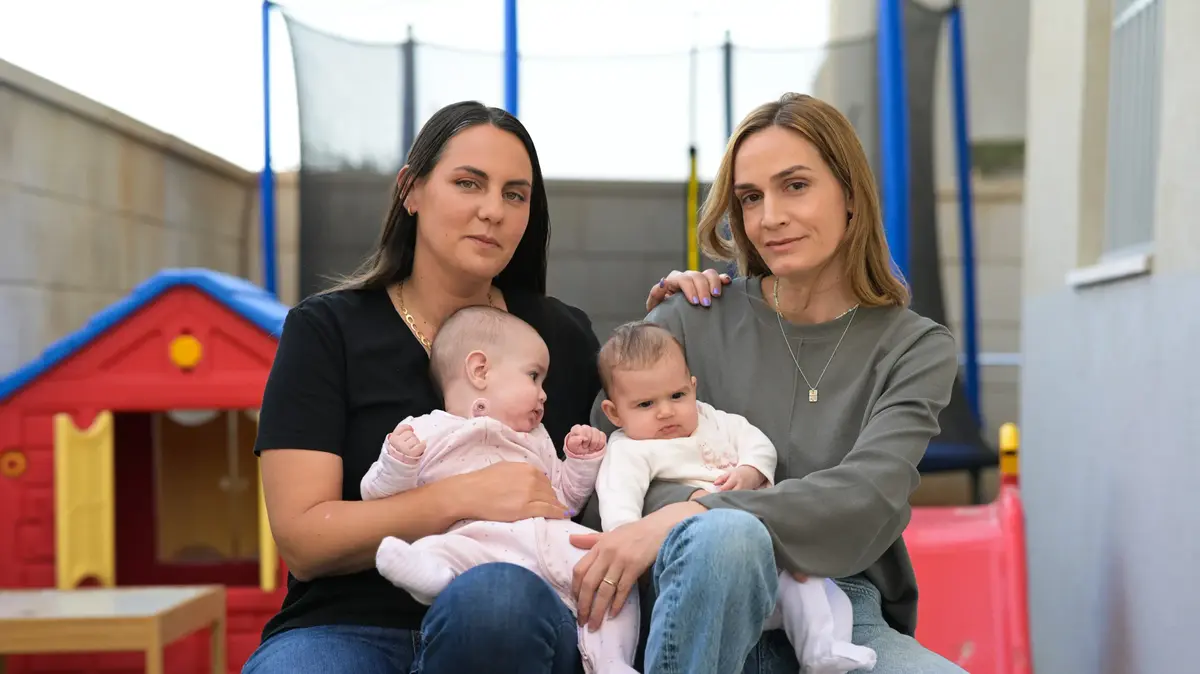Sandra Pérez, 47, has not left home for four months.
She only does it to go to the doctor and because the ambulance picks her up at home, she explains from the Comprehensive Obesity Treatment Unit consultations at the Vall d'Hebron Hospital in Barcelona.
She weighs 180 kilos.
“I haven't left home for four months, without going to see my mother at the residence where she is.
I dare not,” she recounts.
She is afraid of falling, as she has already done several times in the street or in the shower.
And she doesn't help either the looks of others that are nailed to her step or the comments that remind her that she has to eat better.
Its not that easy.
Obesity is a chronic disease that is very difficult to treat, with a highly complex therapeutic approach that requires time and patience.
In Vall d'Hebron there is a specialized unit with endocrinologists, nutritionists,
psychiatrists and surgeons who provide personalized treatment for each patient.
Not everything goes for everyone.
The pandemic was a turning point for Sandra.
Although she has been obese for years – before the health crisis, she weighed 130 kilos, she explains – she used to go out with her friends, walk and take her dog out every day.
But the confinement changed her life dynamics and aggravated her health problem: "Everything was paralyzed, I couldn't go out... The pandemic has killed me."
Added to the weight gain was a worsening of her depression, more anxiety and the explosion of bulimia nervosa that conditions her life: “It has happened to me, for example, waking up at 4 in the morning, wanting to eat cheese and, not having having it, my body would react with a fever and go to the ER with an anxiety attack.
At home I had my bunker, which meant having a pantry of everything next to the bed: I don't need to eat everything, but it reassures me to know that I have it”.
More information
What Childhood Obesity Hides: Adult Diseases in Younger Children
Sandra works from home as a telemarketer.
It has not been easy to find a job and she, "although this is the whiting that bites its tail because you go from bed to computer and from computer to bed", she assumes, at least, she has a job.
She has an assistant who cooks for her and her friends come to her house every day to help her clean up.
His goal is to lose 100 kilos, but he assumes that the task will be complicated and long, also because of his distorted perception of his situation: “I know the theory, I am aware and that is why I came to Vall d'Hebron to ask for help, but I don't see reality: when I see myself in the mirror, I don't see myself as fat.
I have proposed to improve at the level of mobility.
What I want is to be able to move on my own, even if I need help for some things.”
In the image, the doctors measure Sandra's metabolism during a consultation.Gianluca Battista
The unit where Pérez is being treated is a pioneer in its therapeutic approach model, points out Andreea Ciudin, head of this service.
“The units of the hospital centers are surgical, whose purpose is bariatric surgery: from primary care they are referred to the hospital and enter for endocrine, they have an assessment by the dietitian and they go on to have surgery.
Here the treatment is comprehensive and there is an open bidirectional route with primary care” to have a flow of information between the two care levels, points out the specialist.
Any patient who enters the unit —they attend around 800 or 1,000 first visits each year— is seen by an endocrinologist, a dietitian, a psychiatrist and, if they are likely to undergo bariatric surgery, they are also seen by surgeons.
Depending on your associated health problems,
lifetime tracking
“Bariatric surgery is not the goal of this disease, it is part of the treatment.
Not everyone is interested in intervening or they can go to surgery.
What everyone does need is a lifelong follow-up because obesity is chronic and recurrent.
It does not have a curative treatment, ”says Ciudin.
In fact, once the goal set by mutual agreement between the doctors and the patient has been reached —which does not have to be the ideal weight—, the patient has to remain under control: “You cannot let him go and you have to make him understand that You have to keep watching or you will relapse.”
A comprehensive approach is key to avoid steps backwards.
Starting with mental health care: between 30% and 40% of people with obesity have associated symptoms of anxiety and depression, specifies the unit's psychiatrist, Pilar Lusilla.
“Here influences the loss of self-esteem and social stigma.
They are people who have tried to change lifestyles.”
Sandra knows what she is talking about and remembers the awkward looks when she was walking or the unknown people who approached her while she was walking in the park to give her advice or warnings about her weight: “It doesn't help that they are reminding you every day that you are fat .
What do you think, that I don't realize, that I'm not going through my ordeal?
They are not aware of the damage they do with those things and those looks.”
Sandra tests the virtual reality glasses during a consultation in the Vall d'Hebron.Gianluca Battista
It is important, explains Lusilla, to be aware of the situation, "that they understand that there are no magic formulas."
In Vall d'Hebron they are using, precisely, a virtual reality program to help patients assume their baseline state and where they want to go: “We generate an avatar and with virtual reality glasses, they see themselves in their avatar.
They can also choose their therapist and switch from their body to that of the therapist to maintain an internal dialogue and give themselves self-advice”, points out Lusilla.
In the whole therapeutic process, however, there may be steps backwards.
"For this reason, more than following a diet, the important thing is to follow a healthier lifestyle," adds Lusilla.
Even with bariatric surgery, one of the last tricks in treatment, steps can be taken backwards and that is why it is key to select patients well and take into account various variables, from their body mass index to their underlying diseases, their emotional situation or her motivation to lose weight: “Surgery doesn't work
in eternum
.
The effect is a honeymoon: six months or a year.
But later, without the foundations, which is psychology, nutrition and a [healthy] diet, it is a failure.”
Between 15% and 20% of patients regain weight after the intervention.
You can follow
EL PAÍS Salud y Bienestar
on
,
and
.


/cloudfront-eu-central-1.images.arcpublishing.com/prisa/HZ5CRQDSR5FV5FMBMMQDHXKVOI.JPG)












